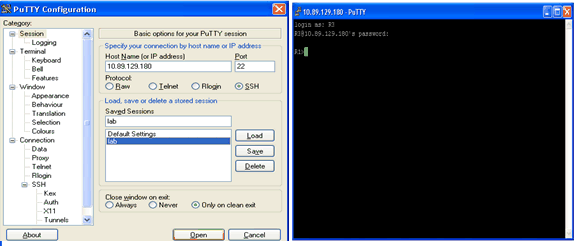Name
ssh - Main API of the SSH applicationDescription
SSH Tunneling Service Active 3 Days. Secure SSH tunnel with OpenSSH, Dropbear, and SSL/Stunnel protocol Active For 3 Days, Our server has support voice chat on online games or like VoIP calls like Discord, Google Duo, WhatsApps, etc.
Interface module for the SSH application
Common Data Types
Type definitions that are used more than once in this module:
boolean() = true | false
string() = list of ASCII characters
ssh_daemon_ref() - opaque to the user returned by ssh:daemon/[1,2,3]
- The Secure Shell Protocol (SSH) is a cryptographic network protocol for operating network services securely over an unsecured network. Typical applications include remote command-line, login, and remote command execution, but any network service can be secured with SSH.
- REPLACED BY THE e-SH 316 STAINLESS STEEL END SUCTION CENTRIFUGAL PUMP (60 Hz) Applications Water circulation Booster systems Liquid transfer HVAC pump replacements General service pumping Features and Benefits Superior Materials of Construction: AISI Type 316L stainless steel pump parts for reduced corrosion and improved strength and ductility. Frame Mounted Design.
ssh_connection_ref() - opaque to the user returned by ssh:connect/3
ip_address() - {N1,N2,N3,N4} % IPv4 | {K1,K2,K3,K4,K5,K6,K7,K8} % IPv6
subsystem_spec() = {subsystem_name(), {channel_callback(), channel_init_args()}}
Ssh-311 Lennox
subsystem_name() = string()


channel_callback() = atom() - Name of the erlang module implementing the subsystem using the ssh_channel behavior see ssh_channel(3)
channel_init_args() = list()
Exports
close(ConnectionRef) -> ok
ConnectionRef = ssh_connection_ref()
Closes a ssh connection.
connect(Host, Port, Options) ->
connect(Host, Port, Options, Timeout) -> {ok, ssh_connection_ref()} | {error, Reason}
Host = string()
Port = integer()
The default is 22, the registered port for SSH.
Options = [{Option, Value}]
Timeout = infinity | integer(milliseconds)
Connects to an SSH server. No channel is started this is done by calling ssh_connect:session_channel/2.
Options are:
[ssh_sftpd:subsystem_spec([])] will be used. It is of course possible to set the option to the empty list if you donot want the daemon to run any subsystems at all.
{shell, {Module, Function, Args} | fun(string() = User) - > pid() | fun(string() = User, ip_address() = PeerAddr) -> pid()}: Defines the read-eval-print loop used when a shell is requested by the client. Example use the erlang shell: {shell, start, []} which is the defaultbehavior. {ssh_cli,{channel_callback(), channel_init_args()}}: Provide your own cli implementation, e.i. a channel callback module that implements a shell and command execution. Note that you may customize the shellread-eval-print loop using the option shell which is much less work than implementing your own cli channel. {system_dir, string()}: Sets the system directory, containing the host files that identifies the host for ssh. The default is /etc/ssh, note that SSH normally requires thehost files there to be readable only by root. {user_passwords, [{string() = User, string() = Password}]}: Provide passwords for password authentication.They will be used when someone tries to connect to the server and public key user authentication fails. Theoption provides a list of valid user names and the corresponding password. {password, string()}: Provide a global password that will authenticate any user. From a security perspective this option makes the server very vulnerable. {pwdfun, fun/2}: Provide a function for password validation. This is called with user and password as strings, and should return true if the password is valid andfalse otherwise. {fd, file_descriptor()}: Allow an existing file-descriptor to be used (simply passed on to the transport protocol). {ip_v6_disabled, boolean()}: Determines if SSH shall use IPv6 or not (only used when HostAddress is set to any). shell(Host) ->
shell(Host, Option) ->
shell(Host, Port, Option) -> _Types: Host = string()
Port = integer()
Options - see ssh:connect/3Starts an interactive shell to an SSH server on the given Host. The function waits for user input, and will not return until the remote shell isended (e.g. on exit from the shell).
sign_data(Data, Algorithm) -> Signature | {error, Reason}
Types: Data = binary()
Algorithm = 'ssh-rsa'
Signature = binary()
Reason = term()Signs the supplied binary using the SSH key.
start() ->
start(Type) -> ok | {error, Reason}Types: Type = permanent | transient | temporary
Reason = term()Starts the Ssh application. Default type is temporary. See also application(3) Requires that the crypto application has beenstarted.
stop() -> ok
Stops the Ssh application. See also application(3)
stop_daemon(DaemonRef) ->
stop_daemon(Address, Port) -> okTypes: DaemonRef = ssh_daemon_ref()
Address = ip_address()
Port = integer()Stops the listener and all connections started by the listener.
stop_listener(DaemonRef) ->
stop_listener(Address, Port) -> okTypes: DaemonRef = ssh_daemon_ref()
Address = ip_address()
Port = integer()Stops the listener, but leaves existing connections started by the listener up and running.
verify_data(Data, Signature, Algorithm) -> ok | {error, Reason}
Ssh 39 Helmet For Sale
Types: Data = binary()
Algorithm = 'ssh-rsa'
Signature = binary()
Reason = term()Download external recovery startup software for mac mohaje newest. Verifies the supplied binary against the binary signature.
Ssh 30 Hari
Referenced By
ct_sshSsh-38
(3)


